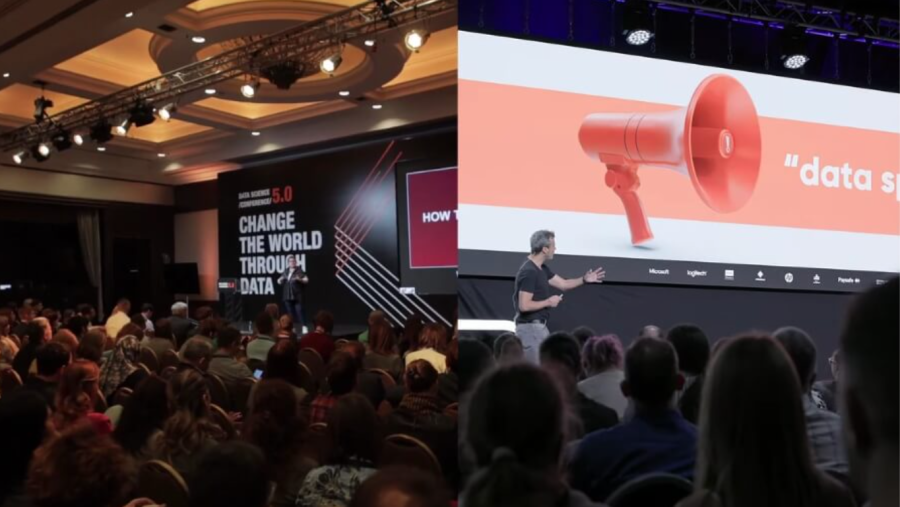Conferences have become essential events where researchers, scholars, and professionals come together to exchange ideas and share their latest work. These events provide a platform for intellectual discussion and collaboration across various fields. If you’re wondering how to handle these events successfully, you might be asking about making the most of academic conferences: A guide for researchers.
Taking part in an academic conference offers numerous opportunities, from networking with experts to presenting your research. To truly benefit, you need to be prepared, engage actively, and follow up effectively. By doing so, you can build lasting connections and gain valuable insights that will support your academic career.
Do you want to know how to get the most out of the upcoming events? This article provides all the essential tips and strategies you need to succeed, so keep reading to discover everything you need to know!
The Development of Academic Conferences: Then and Now
Over time, academic conferences have changed dramatically. In the past, these events were small gatherings where scholars and researchers would come together to discuss their work in person. They often took place in local or regional settings, and participation was typically limited to individuals within a particular academic circle. Communication was primarily face-to-face, with fewer attendees and limited reach beyond the conference venue.
As technology advanced and global collaboration became more common, academic conferences grew in both size and scope. Today, these events are not just about presenting research; they offer opportunities for networking, interdisciplinary discussions, and international cooperation. With virtual components and global access, researchers can connect with peers from different regions, making conferences more dynamic and far-reaching.
If you're looking for opportunities to expand your academic presence, you might consider attending an upcoming international conference in Canada to network and collaborate. These conferences attract scholars from around the world, creating a rich environment for collaboration and discussion. The movement towards larger, more inclusive events has transformed the way knowledge is shared and developed in the academic world.
Why Are Academic Conferences Important?
A crucial role is played by academic conferences in advancing knowledge and exchanging ideas. They provide a platform for researchers, scholars, and professionals to come together, share their work, and learn from one another. Here's why they are so important.
Networking Opportunities
During academic conferences, attendees have the opportunity to network with others from the same field. Whether you're a student, early-career researcher, or established academic, these events allow you to build professional relationships. These connections often lead to future collaborations, mentorships, or even job opportunities, making networking a valuable aspect of conferences.
Sharing and Receiving Feedback
Presenting your research at a conference gives you the chance to share your ideas with a broader audience and receive constructive feedback. This feedback can help improve your work, offer new perspectives, and refine your methods or findings. Similarly, attending others’ presentations introduces you to the latest research and different approaches in your field.
Learning About New Trends and Research
Academic conferences serve as a hub for the latest advancements and trends in a particular field. By attending, you can learn about recent studies, emerging technologies, and innovative methods that may influence or enhance your research. This keeps you informed about the direction of your field and may spark new ideas for your future projects.
Opportunities for Publishing
Many conferences offer opportunities to publish your work in conference proceedings or associated journals. This can be a way to gain recognition for your research and build your academic profile. Conference publications are often peer-reviewed, providing an additional layer of credibility and ensuring the quality of the work being presented.
Professional Development
By attending conferences, you can improve various professional skills, such as public speaking, presenting complex ideas clearly, and handling audience questions. These events often include workshops and panel discussions, which can help you develop skills like grant writing, teaching, and navigating your academic career path effectively.
Professional growth and new knowledge are some of the benefits of academic conferences. They are an essential part of the academic community, helping individuals stay connected and informed while advancing their careers.
Making the Most of Academic Conferences: A Guide for Researchers
The purpose of academic conferences is to provide researchers with an opportunity to share their research, gain feedback, and form meaningful connections. To truly benefit from these events, it’s important to prepare, engage, and follow up effectively. Below are key strategies for success.
Plan and Prepare in Advance
Before attending a conference, review the schedule and identify sessions, workshops, or presentations that align with your research. If you’re presenting, practice your talk thoroughly and anticipate potential questions. Organize your time efficiently, allowing space for networking and exploring other sessions. Proper preparation ensures you gain the most value from the event, focusing on relevant content.
Engage with Speakers and Attendees
Conferences offer a great chance to connect with experts and peers. Engage with speakers by asking insightful questions during presentations. Approach fellow attendees during networking breaks, introducing yourself and discussing common research interests. These interactions can lead to fruitful collaborations, mentorships, or valuable ideas, helping to enhance your research or open new opportunities.
Present Your Work Effectively
If you’re presenting, communicate your findings clearly and confidently. Ensure your presentation is accessible to the audience’s knowledge level, emphasizing key points and practical implications. Engage with the audience by encouraging questions and dialogue. A well-prepared presentation not only showcases your research but also helps you gain constructive feedback and valuable exposure in your field.
Attend Workshops and Panel Discussions
A workshop or a panel discussion offers valuable learning opportunities in addition to research presentations. These sessions often cover practical skills, emerging research trends, or policy debates. Attending these discussions can expand your knowledge and introduce new ideas that could benefit your research. They provide a broader perspective on your field and help you stay updated on relevant topics.
Take Notes and Reflect on Key Insights
During the conference, take detailed notes on presentations and discussions. Focus on key insights, methods, or perspectives that can influence your research. Reflecting on these notes after the conference allows you to apply new ideas to your work. Keeping organized notes ensures you can reference valuable information later, turning conference experiences into lasting benefits for your research.
Network with Purpose
Rather than trying to meet everyone, focus on building meaningful connections. Engage in deeper conversations with those who share similar research interests or goals. Be genuine and professional in your interactions. Exchanging contact details is just the first step; following up later with a message or idea strengthens the relationships and opens doors to potential future collaborations.
Follow Up After the Conference
After the conference, promptly follow up with people you’ve met. Whether through email or professional social media, express appreciation for their insights or offer further collaboration ideas. Timely follow-up is essential to maintaining and building on those connections. This step solidifies relationships and keeps the conversation going, potentially leading to future partnerships or research opportunities.
By preparing thoroughly, engaging meaningfully, and following up strategically, researchers can maximize their experience at academic conferences. Besides presenting research, these events provide opportunities to learn, network, and grow personally and professionally.
How to Manage Your Time Effectively During an Academic Conference
With numerous sessions, networking opportunities, and social events, attending an academic conference can be a challenge. With proper planning and organization, you can participate in the conference without any problems. Here's a guide to help you stay on track.
Step 1. Create a Schedule
Before the conference begins, review the agenda and identify the sessions that interest you the most. Make a personalized schedule that includes the times and locations of these sessions. Ensure you allocate time for networking and breaks to recharge. Having a clear plan will help you avoid feeling lost or overwhelmed during the event.
Step 2. Prioritize Key Sessions
Not every session will be relevant to your research or interests. Prioritize the key sessions that align with your goals for attending the conference. Mark these as must-attend events in your schedule, and consider attending only a few sessions in-depth rather than trying to cover everything.
Step 3. Set Time Limits
While networking is essential, it’s easy to get caught up in conversations that take up more time than intended. Set time limits for each interaction to ensure you can meet various people and attend multiple sessions. This will help you maintain a balanced schedule throughout the conference.
Step 4. Utilize Breaks Wisely
Conferences often include breaks between sessions. Use these times wisely by reviewing your notes, catching up on materials from previous sessions, or making new connections. These short breaks can significantly improve your overall experience and keep you energized for the next session.
Step 5. Stay Flexible
Despite having a plan, things may not go as scheduled. Stay flexible and be open to unexpected opportunities that arise, such as an engaging speaker or an interesting discussion. Allowing some spontaneity can lead to valuable experiences you may not have anticipated.
Managing your time effectively during an academic conference can lead to a rewarding experience filled with valuable insights and connections. With the right strategies, you can navigate the event and make the most of every opportunity.
Tips for Following Up With Contacts After the Conference
Building lasting professional relationships requires following up with new contacts after a conference. A well-timed, thoughtful message can open doors for future collaboration and strengthen your network. Here are some essential tips for effective follow-up.
Send a Timely Message: Reach out within a few days while the interaction is still fresh. This helps you remain memorable and shows that you're interested in maintaining the connection.
Personalize Each Message: Avoid standard follow-ups. Mention specific topics from your conversation or the conference session you both attended. Personalizing your message adds meaning and strengthens your connection.
Express Gratitude: Thank them for their time, insights, or any help they offered. Showing appreciation makes the communication more genuine and reflects a professional, courteous attitude.
Mention Future Collaboration: Highlight potential areas for collaboration or shared interests. This can plant the seed for future projects, research opportunities, or even partnerships that benefit both parties.
Share Resources or Ideas: Include something useful like a related article, resource, or insight you’ve come across since the conference. Offering value helps establish a more meaningful connection and leaves a positive impression.
Connect on Professional Networks: Follow up by connecting on professional platforms like LinkedIn. This not only strengthens your relationship but also keeps you informed of each other’s work and future developments.
Keep it Brief and Polite: Ensure your message is concise and professional. Avoid overwhelming your contact with lengthy messages. Being respectful of their time will make your follow-up more effective and appreciated.
Building professional relationships after a conference takes effort, but it’s worth it. Thoughtful follow-ups keep connections alive, leading to future collaborations and opportunities. Make it a habit to expand your network with genuine, meaningful communication.
Bottom Line
Academic conferences offer an excellent opportunity for researchers to share their work, learn from others, and form lasting professional connections. Whether you're a professional academic or just starting, these events can significantly strengthen your career and research impact.
To truly succeed, "Making the most of academic conferences: A guide for researchers" suggests thorough preparation, active participation, and effective follow-up. By carefully planning your time, engaging with fellow researchers, and reflecting on key insights, you can maximize the benefits these conferences provide and advance your academic career.
Remember to stay organized, network purposefully, and always be open to new ideas and opportunities. With these tips in mind, you're well on your way to making the most of your next conference. Best of luck with your adventure!









